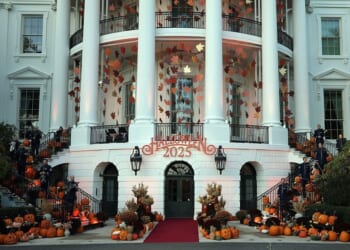On Oct. 7, 2020, a Twitter account by the name of “nodrog danarb” issued a warning about the coming election.
“All conservatives vote in person,” the account tweeted, tagging the official Twitter account of the Washington Office of the Secretary of State. “Don’t trust the mail.”
Such posts were a dime a dozen in the lead-up to the 2020 election, as concerns about the COVID pandemic fueled an unprecedented spike in mail-in voting. This tweet, though, caught the attention of the Department of Homeland Security’s Cybersecurity and Infrastructure Security Agency (CISA), whose remit includes election infrastructure.
The agency had received an email from the Washington secretary of state’s communications director, Kylee Zabel, flagging the post as “potential misinformation.” CISA had solicited such communication, and within 20 minutes, the agency had forwarded the complaint to Twitter. By 8 a.m. the next day, Twitter had taken the tweet down.
The incident, which has not been previously reported, is one of the many examples of government jawboning discussed in a new report on CISA by the Senate Committee on Commerce, Science and Transportation.
As early as 2018, the report reveals, CISA was holding meetings with social media companies about alleged misinformation—both foreign and domestic—on their platforms. And in 2020, CISA directed state election officials to report false or misleading posts to the agency so that it could forward those reports to social media companies, a practice known as switchboarding.
CISA never identified a statutory basis for these practices, according to the report. The most forthright defense of the agency’s actions came from former CISA director Jen Easterly, who said in 2021 that “the most critical infrastructure is our cognitive infrastructure.”
“Building that resilience to misinformation and disinformation, I think, is incredibly important,” Easterly said. “We are going to work with our partners in the private sector and throughout the rest of the government and at the department to continue to ensure that the American people have the facts that they need to help protect our critical infrastructure.”
Titled “The Mechanics of Government Censorship: How the Biden Administration Converted the Cybersecurity and Infrastructure Security Agency into the Thought Police,” the report, released Monday, describes how a federal agency created with bipartisan support became a tool of progressive censorship. It comes as some Republicans have broken with the Trump administration over its perceived bullying of ABC News, warning that precedents set today could be used to stifle conservatives tomorrow.
“Our report shows that the Biden administration used CISA to strong arm social media companies into taking action against speech protected by the First Amendment,” said Sen. Ted Cruz (R., Texas), the chairman of the Senate commerce committee, who this month blasted the chairman of the Federal Communications Commission, Brendan Carr, for threatening to revoke ABC’s broadcast license over the comments Jimmy Kimmel made about the assassination of Charlie Kirk. “For the past decade, I’ve led the fight against government censorship, whether it’s CISA or the FCC or the Biden White House. Inevitably, these tactics have been and will be disproportionately used to silence conservatives.”
The report shows how the Biden administration used the levers of federal power to stifle dissent—without a murmur of concern from political allies.
The law establishing CISA, which protects critical infrastructure, including election systems, from cyber and physical threats, passed the House and the Senate unanimously and was signed into law by President Donald Trump in 2018. But mission creep set in almost as soon as the agency was founded.
A 2023 report by the House Judiciary Committee’s Select Subcommittee on the Weaponization of the Federal Government found that CISA had “facilitated the censorship of Americans directly and through third-party intermediaries.” Amid a First Amendment lawsuit against the Biden administration, the agency outsourced its switchboarding efforts to a CISA-funded nonprofit, the Elections Infrastructure Information Sharing and Analysis Center (EI-ISAC), in order to mitigate legal risk. It also scrubbed its website of references to “malinformation”—a term the agency defined as information that is “based on fact, but used out of context to mislead, harm, or manipulate.”
That concept was responsible for some of the most overt overreach of the Biden era. In one particularly extreme case, the elections office in Loudoun County, Virginia, flagged an unedited video of a county official “because it was posted as part of a larger campaign to discredit the word of” that official. The report—which EI-ISAC forwarded to Twitter—noted that the poster was “connected to Parents Against Critical Race Theory.”
The Senate report provides new details on how CISA sought to evade oversight of its activities. In 2021, for example, as part of an audit of the agency’s anti-disinformation efforts, the DHS Office of Inspector General repeatedly asked CISA for the names of its social media contacts. The agency declined to provide that information and warned its contacts at social media companies about the probe, according to documents obtained by the Senate committee, hiding the full extent of its coordination with social media platforms.
The report argues that CISA is a cautionary tale for the next frontier in online regulation: artificial intelligence. President Donald Trump has vowed a Butlerian jihad against “woke AI,” issuing an executive order targeting AI models that “encode partisan or ideological judgments” into their outputs. Yet it was also Trump who oversaw the creation of an agency that would facilitate the censorship of his supporters. And though the report is framed as an attack on the Biden administration, it also shows that CISA’s most overt efforts to police speech took place around the 2020 election, while President Trump was still in office.
“Congress must continue to take an active role in the operations and policies of federal agencies because, regardless of who occupies the White House, unelected bureaucrats have outsized power to direct agencies’ activities,” the report reads. “As members of Congress consider legislation to establish new AI regulations and AI-focused government agencies, they should keep in mind the Biden administration’s transformation of CISA—which Congress created with widespread bipartisan support to protect national security—into an unaccountable censorship agency.”

















